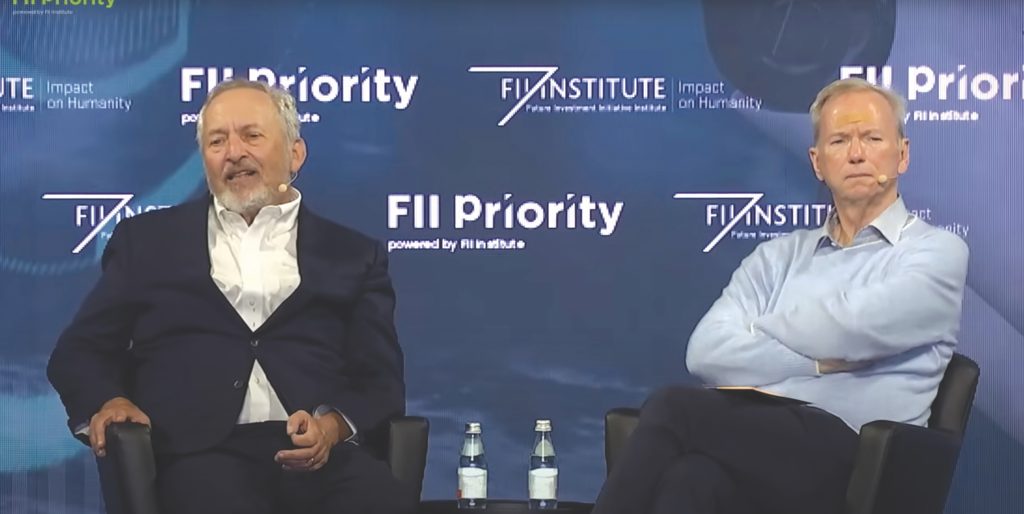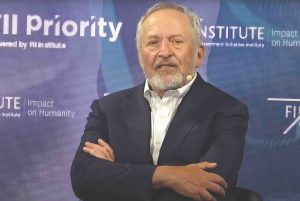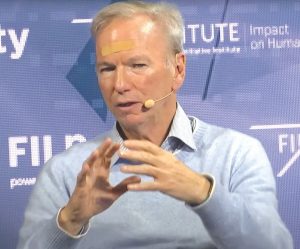February 22, 2024
Larry Summers and Eric Schmidt discussed technology and the Global Economy at FII PRIORITY Miami.

Larry Summers, Former United States Secretary of the Treasury and Eric Schmidt, Former CEO of Google.
Eric Schmidt: We would like to express our gratitude to FII for organizing this event, which has been highly successful in Miami for the third time. The keynote speaker, Larry, is highly regarded in the industry, and his predictions have significant influence over market movements. During the event, we learned that there may be some uncertainty regarding interest rates, and we appreciate the valuable insights that were shared.
Larry Summers: Last week, I stated my belief that the probability of the next move by the Fed being upward is at 15 percent. My reasoning behind this is two-fold – firstly, the economy appears to be showing signs of strength, with a slight sense of reacceleration in the goods-producing sector, tight labor markets, and financial conditions that are semi-euphoric, indicating that interest rates have not had as much of an impact as expected. Secondly, there is increasing evidence that inflation may not be as down for the count as previously assumed, with owner-occupied housing, or owner-equivalent rent, likely to rise three to four percent this year based on the trend in single-family housing. When we take out the effects of food, energy, and housing, the so-called super core inflation is running well above two, and even faster for the last month than the previous three, which were faster than the last six.
When we look at the current state of the economy and the elements of financial euphoria, along with the possibility of inflation not reaching target, it raises the question of what action the Fed will take. While they are unlikely to raise rates now or next month, they are also unlikely to cut rates. The markets are currently predicting that the first cut will not come until June, leaving a considerable amount of time for changes to occur. If the economy remains strong and inflation appears robust, the Fed may decide that cooling things off is the right course of action.
One common mistake in the markets is thinking solely in terms of modes, or the most likely scenario. While this can be useful, it is also essential to consider the tails, or the less likely outcomes. Several months ago, when the market was predicting six cuts in 2024, I considered the likelihood of 10 and two, and found two to be more compelling. This led me to believe that six was an incorrect prediction. Currently, the market is predicting four cuts, which could happen, but is likely a little above the center of mass of what I would consider.
It is crucial to recognize that there is a tail probability that the Fed’s next move will be upward, which needs to be handled delicately, as it is not yet fully reflected in the markets.
Eric: I have a couple of follow-up questions regarding the current election year. It is widely believed that during an election year, the government typically employs a looser monetary strategy as it is considered beneficial for all parties involved. However, your perspective seems to differ from this conventional wisdom. Thus, in the event that influential forces within the government push for a looser monetary strategy, while you continue to advocate for a tighter one, how do you foresee this issue being resolved? Given the high political stakes involved, this could potentially be a challenging situation to navigate.
Larry: Economists have conducted extensive research on the relationship between the Federal Funds rate and various economic indicators, including those that occur in presidential election years. Despite this, it has proven challenging to identify any discernible differences in these relationships during such years. For example, it is difficult to ascertain whether the Taylor Rule applies differently during election years, or whether there are more rate movements in the first half of the year compared to the second half. Rates may not necessarily be lower during election years, contrary to popular belief.
The psychological impact of past mistakes made by the Federal Reserve (Fed) cannot be understated. A culture of caution has been deeply ingrained within the Fed, with a strong emphasis on avoiding the errors that led to high inflation during the 1970s, as demonstrated by Arthur Burns and G. William Miller. The Fed’s reluctance to raise rates too quickly in the wake of the COVID-19 pandemic reflects this caution, as evidenced by the chairman’s statement that rates were unlikely to be raised above zero until 2024. However, this caution must be balanced against the risk of inflation. Therefore, it would be a mistake to disregard the possibility of a rate increase altogether, as there is a 15 percent chance of this occurring.
Eric: I have a question about the current state of global markets and globalization. As we know, the world is facing significant challenges, including two ongoing wars, a range of issues in the global south, and concerns over the role of China and other aligned countries in global trade. These factors have contributed to rising prices and have raised questions about how the market is pricing in these risks. I’m curious to hear your thoughts on how these factors may impact the market moving forward.
Larry: The current geopolitical and political risks in the market are of significant concern. While political affiliations may sway personal opinions, it is critical not to make investment decisions based on election outcomes. In the past 25 years, the value of U.S. companies has risen significantly, surpassing the value of companies headquartered across the world. This achievement is a testament to the strengths of American capitalism, particularly its ability to attract capital. However, it is essential to acknowledge the rule of law, which has been a significant contributor to this success. The law must be enforced without prejudice, irrespective of who is involved. This critical aspect of the American system may be called into question during the upcoming election.
Populism, be it right-wing or left-wing, has consistently proven to be detrimental to economic performance over the years. Such policies damage economies and markets alike. The markets anticipate future events, and there is a real risk of nationalist populist policies being implemented both domestically and internationally. These policies could result in restrictions on goods, capital, and people. They may also threaten the collective security arrangements that exist. While current market assessments are plausible, there is still a significant room for error, particularly in favor of the high side.
The late Henry Kissinger believed that order and predictability are prerequisites for positive outcomes. He was convinced that anarchy and unpredictability would lead to chaos and suffering. The world is currently headed towards an era of uncertainty that may result in a lack of predictability, which, in turn, can lead to chaos and suffering. It remains to be seen whether or not the markets have fully priced in such risks. Nonetheless, it is advisable for every investor to make their personal judgment.
Eric: The statement made by Henry was exceptionally well-articulated and deeply missed. Moving on to the topic of discussion, I would like to initiate a conversation regarding Artificial Intelligence.
Larry: Eric, you’ve written a book on it with Henry. It’s been a professional preoccupation of yours for many years. I’m someone who, when I think of AI, when I think of fusion energy, when I think of CRISPR and some of the revolutions in the life sciences, what I remind myself, and it’s an antidote to some of the things that I’ve been saying, is that events are 75 percent bad. Trends are 75 percent good, the world is shaped at least as much by trends as it is by events, but we all tend to focus on events because they are events, they’re what is in the news. So I guess I’m interested in your sense of how do you see this profound transformation.
I kind of suspect that the synthetic intelligence is maybe the most fundamental of the revolutionary technological trends in this moment. And I’m just interested in how you see it in terms of how will historians look at it a hundred years from now or 500 years from now.

Eric: The presence of non-human intelligence is a significant development that will manifest itself in ways beyond the stereotypical image of a robot performing menial tasks. The emergence of polymaths, individuals of exceptional intelligence and versatility, has historically shaped the course of human endeavor and provided invaluable assistance in daily life. It is my contention, unsupported by empirical evidence, that AI has the potential to double everyone’s productivity, enabling individuals to write more code, produce more papers, handle more legal cases, or treat more patients than before. However, the advent of AI raises a crucial question of decision-making, which must remain under human control. Furthermore, as machines begin to make independent decisions, which we anticipate to occur within the next three to five years, we must address the ethical considerations surrounding this new form of intelligence. The AI system will operate on the basis of text-to-action, executing tasks based on user requests and providing suitable recommendations. The AI system will also be capable of communicating via emails, phone calls, and other mediums. However, unless we exercise caution, these technologies can be exploited for malevolent purposes. The frenzy surrounding AI is due partly to the American capital market’s willingness to fund ventures with no product, team, revenue, or coherent vision. Nonetheless, we are optimistic that this technology will be a significant innovation that will be invented in the United States.
Larry: The following text reflects on the potential impact of artificial intelligence (AI) on human intelligence. I wonder about the domains where AI will have the most significant effect and asks whether its development will prioritize IQ over EQ. Additionally, I contemplates whether AI will replace individuals who engage in creative intellectual work or those who perform more routine tasks. They also note the stages of technological development and the shift towards new tasks that were not previously perceived. While many discussions about AI center on its transformative power, the author encourages considering the domains where AI will have a more immediate and profound impact, as well as those where it will be less transformative in the near future.
The current presumption is that everything has changed, albeit not in the same order as expected. As you may know from your previous studies, automation tends to replace the most dangerous and underprivileged jobs. Based on this understanding, it is reasonable to assume that this trend will continue. We have previously discussed the matter of what to do with all the jobs that are displaced when there are no apparent alternatives available. For instance, why are security guards still human when robots possess several advantages? Robots don’t sleep, get drunk, or require high wages, among other things.
There are many other functions that are easy to understand and can be automated relatively quickly. Lawyers, for example, can have their work done by paralegal briefs or LLMs. Similarly, in programming teams, there are times when some programmers are replaced by testing programs or automated tools. Jobs that involve over-checking or second-order effects will also be significantly impacted and automated.
The question that often arises is, “when will this impact me?” The answer is that it will be the last to affect you, but it is not a question of never. The arrival of this type of intelligence is a long-term issue that will not occur anytime soon. With that said, it is worth noting that at events, individuals often claim that computers will never be able to write something with the same human experience and impact as humans. Nonetheless, this is not correct. These systems can analyze the experiences of millions of people and produce something as good as the best human writers. Therefore, it is crucial to remember that these systems examine human experiences and generalize in ways that individuals, no matter how intelligent, cannot.
Eric: We can now turn our attention to the questions from the audience. Mr. Steiner from Canada had an interesting query regarding the interdependence of economies, decoupling, and the role of the US dollar as the reserve currency. He wanted to know if the global economy can thrive if China and Europe are not growing while the US is or if the growth of China and Europe is essential for the US and global economic growth. Dr. Summers, would you please share your insights on this matter?
Larry: There is no doubt that economic growth in one region contributes to growth in other regions, rather than coming at their expense. The global economy is a positive sum game, in contrast to a zero sum or negative sum game. However, it is important to clarify that the prosperity of other parts of the world is not a prerequisite for growth in the United States. A significant portion of the U.S. economy is internal, and while
the U.S. would benefit from China’s growth, the partial elasticity of U.S. growth with respect to Chinese growth would likely be in the high single digits of basis points. This means that if China’s growth rate decreases by one percentage point, U.S. growth may decline by eight one-hundredths of a percentage point, holding other factors constant. Although this effect is present, it is not significant for large economies like the United States. For smaller countries with very big neighbors, such as Monaco and France, the impact of their growth rate would be much larger. Given that the U.S. economy is approximately 10 times larger than the Canadian economy, fluctuations of one operating on 10 are much less important than fluctuations on 10 operating on 1. Therefore, when making a U.S. economic forecast, the state of the Canadian economy would not be a primary consideration.
Overall, while economic growth in other regions is beneficial, it is not essential for the United States’ economy to prosper.

Eric: As we come to a close, I would like to express my gratitude to Larry for his 30 years of dedicated service. Your contributions to the government have been invaluable, and we look forward to your continued service in the near future. I would like to extend my thanks to everyone present here today for their time and effort.





